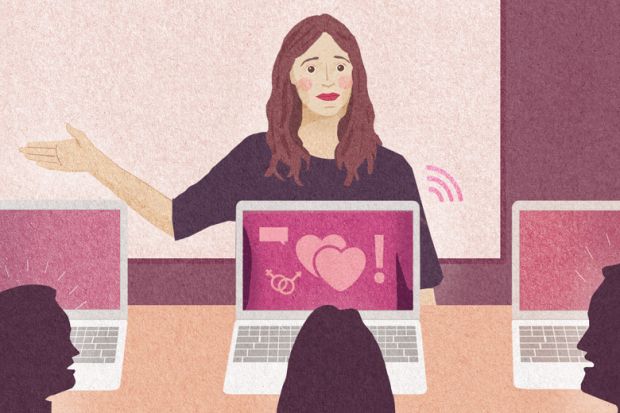The most difficult moment of my early teaching career happened during an end-of-module assessment, when a group of students who had been working on a devised play about internet safety began to recite sexually explicit monologues. These, it gradually dawned on me, were entries from my own personal blog.
Although I squirmed, pulling my face into a fixed, neutral expression that I hoped did not betray my skin-prickling discomfort, I was not surprised. I had been expecting this or something like it for some time.
A couple of years into my first academic appointment, I started writing a sex and relationships blog, documenting my life as a single woman. This decision contravened all the advice that I’d been given about how to build a successful academic profile. During my induction, I was given a copy of the university’s social media policy, which indicated that we were expected to bring the same cold, objective approach to our lives online as we might to a lab experiment. Going online, even by adopting a Twitter handle, was presented as fraught with risk.
My former employer was not alone: a cursory glance at the social media policies of several universities across the UK presents a confused and often contradictory picture. The University of Bristol, for example, “is committed to freedom of expression” but also reminds staff and students that “professional responsibilities apply regardless of the medium being used”. It can be difficult to find an appropriate balance. While we are expected to present a “professional” front, where our personal lives are cleaved cleanly away from our academic endeavours, we are also increasingly expected to maintain an online presence, in the form of a staff profile at the very least. Many academics use blogs to disseminate research, and contributing to the digital output of major mainstream publications can support a convincing impact narrative. At the same time, more of our social lives than ever before take place online – often on the same social media platforms where we share our research and make professional connections – meaning that the boundaries once separating our private and professional lives are dissolving.
As a lecturer in a creative subject, I have struggled with the idea that my professional and personal identities should be separate. The personal aspects of my life that I am driven to write about publicly impact on my work in visible and invisible ways. And the dissolution of the distinction between the private and the public facilitated by social media and other online platforms brings opportunities as well as risks.
Some of the most exciting sociology and cultural studies research happens at the intersection of the private and the public.
For example, London School of Economics scholars Lisa Muggeridge and Lisa Mckenzie are both self-identified working-class mothers, who use social media and blogs to share stories from their private lives, which link in to their academic research. In a widely read open letter to Labour leader Jeremy Corbyn, posted on her Twitter profile, Muggeridge used details from her research and her experience to argue that the actions of Corbyn’s supporters betrayed the “poor” people (like her) who they claimed to represent. By “making it personal” and public in this way scholars are able to connect with groups who feel that academia is detached from the reality of “real-world” experience.
Even the risks of overexposure are often worth the rewards that they bring. For example, when performance artist and scholar Lauren Barri Holstein was ridiculed in the press for sharing with her students an online video of her feminist performance work, including displays of her “private” parts, they responded by arguing that she had opened their eyes to the critical power of “shocking” content. “The more shocking you find it, the more you need to see it,” one of them told student newspaper The Tab. “Perhaps that’s why people don’t want to look or critically engage.”
When my students launched their performed criticism of my blog, I similarly encouraged them to think critically about why people might choose to make themselves vulnerable online. This stimulated a conversation about the difference between carelessness with private information that might warrant a safety concern and creative practice that deliberately makes the artist vulnerable.
Beyond teaching, I have found that being strategically open about my personal life has allowed students to raise “private” issues that they might otherwise be embarrassed to discuss. With increasing student anxiety and expectations that academic staff will serve a pastoral role, revealing vulnerable parts of oneself can act as a short cut to connecting with students beyond the classroom.
Ultimately, using online platforms to interrupt the private/public divide can deliver important reminders to our employers, students and the wider public about the ways that our personal circumstances influence our professional lives. Our sexual identities, our bodies, our marital status impact on our careers whether we like it or not. Having a partner or not, children or not, family money or not, being subject to low-level sexual harassment or not, all affect how we are able to organise our careers. Being open about our private lives online brings risk, but it can be a powerful means of addressing inequality in the university system, and equipping our students with the critical skills to transform the public and private worlds they’ll soon have to engage with.
Katie Beswick, a lecturer in drama at the University of Exeter, is currently writing a book about the performance of council estates on- and offstage. She tweets @ElfinKate and @ktbez
Register to continue
Why register?
- Registration is free and only takes a moment
- Once registered, you can read 3 articles a month
- Sign up for our newsletter
Subscribe
Or subscribe for unlimited access to:
- Unlimited access to news, views, insights & reviews
- Digital editions
- Digital access to THE’s university and college rankings analysis
Already registered or a current subscriber?




